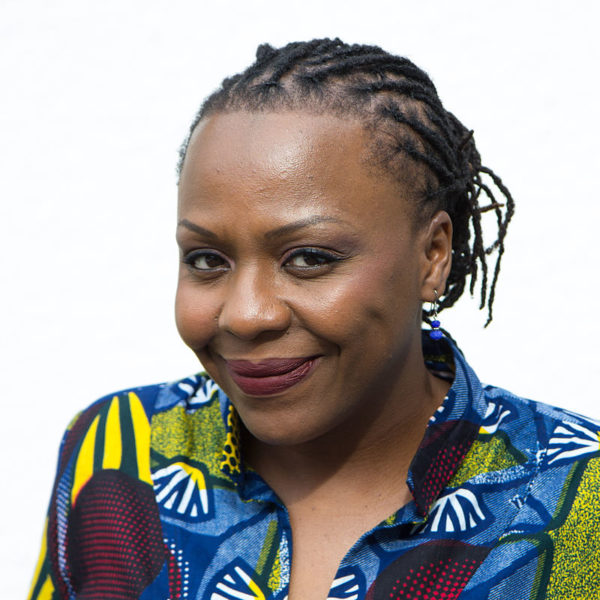
The Brittle Paper Person of the Year award is in its third year. The award has become an important way of celebrating excellence and identifying those qualities we value in the leaders of our intellectual communities. By highlighting the efforts of those committed to building our communities, we hope to inspire others and ourselves to do better.
The 2017 Brittle Paper Person of the Year is Lola Shoneyin.
“If there was more space for people to think, do things and create, I just feel we would all be happier,” Shoneyin says during a recent interview featured in the Nigerian Guardian. In many ways, Shoneyin’s life has been dedicated to breaking down the systemic structures that stifle creativity and expression. Both in her writing and her work as a community leader, Shoneyin tirelessly advocates for a culture of creative and critical thought. In 2017, Shoneyin, more than anyone else out there, has worked the hardest to provide platforms where communities of readers and writers are empowered to think, do, and create.
Shoneyin is a Nigerian poet and novelist. She has authored three poetry collections but is best known for her debut novel The Secret Lives of Baba Segi’s Wives, a delightfully scathing critique of polygamy and a celebration of feminine bond. A favorite of playwrights, the novel has been adapted for stage and performed in different parts of the world. In the past few years, however, Shoneyin has spent less and less time under the literary spotlight as a writer. This is, in part, because she has become an architect of literary dreams, creating enabling conditions for other writers to succeed.
We cannot emphasize enough the importance of someone such as Shoneyin for the growth of African writing and literary culture. Today, Africans are writing like never before. The global influence of African literature is rapidly expanding. But without powerful institutions, this renaissance we are witnessing could turn out to be a brief flash. Here today, gone tomorrow. There would be no writers (and readers) without sustainable platforms that nurture creative thinking and enable creative work. We need publishers, literary marketplaces, literary festivals, functional public schools, creative writing workshops, information literacy programs, and so on. That is why we need folks like Shoneyin who work tirelessly behind the scene to set up the durable structures needed to shore up our dreams of a bright future for African literature.
For Shoneyin, literature is welded to life. Ever since she returned to Nigeria in 2001, she has organized creative communities in cities where she lived. When she lived in Ibadan, she established the Ibadan Art Renaissance. When she lived in Abuja, she established Infusion with Dapo Oyewale. In 2012, she established the Ake Arts and Book Festival. In the short span of five years, Ake Festival has become a literary Mecca in a country where the literary arts still suffers considerable neglect. Nigerian journalist and filmmaker Wana Udobang couldn’t have been more accurate in calling Ake Festival a pilgrimage. The annual life cycle of the Nigerian literary scene now revolves around this festival that attracts writers and artists of different generations and communities around the globe. They assemble at Ake, Abeokuta to reflect on global issues, using Africa as starting point. The festival draws a crowd of young readers and aspiring writers who find the talks, interviews, conversations, master classes, workshops, etc. both empowering and delightful. Like a wellspring of artistic inspiration, Ake Festival draws readers and writers from far-flung corners of the country and the world.
Shoneyin inspires us with her commitment to literature as a force for empowerment. This year, in addition to her work with Ake Festival, she spearheaded the inaugural edition of the Kaduna Book and Arts Festival, a historic event that helped challenge prejudiced assumptions about Northern Nigeria and staged a never-before witnessed dialogue between the north and the south within the context of literature and art. But what started out as a festival has now opened up other opportunities. Book Buzz Foundation, the not-for-profit organization behind Ake Festival and KABAFEST, is collaborating with an EU-funded initiative to provide training for writers and artists in northern states.
No one, within the African literary community, has captured this opportunity-creating aspect of leadership as well as Shoneyin. Perhaps this is because Shoneyin comes to literature from the standpoints of a reader, a writer, a critic, and an entrepreneur. Equipped with these multiple angles of vision, Shoneyin is able to foster literary culture in ways that disrupt the status quo and, thus, enable more people to gain access to opportunities.
Publishing is the heart and soul of literary culture. In the most basic sense, it is the engine that propels the writer’s ideas into the world of readers and tastemakers. As part of Shoneyin’s commitment to creating conditions that make creative expression possible, she helped establish Ouida Books, a publishing outfit based in Lagos. In less than two years, Ouidah Books has provided publication opportunities to emergent voices, in addition to making the works of globally acclaimed writers such as Nnedi Okorafor and Ayobami Adebayo available to Nigerian readers.
Shoneyin understands that institutions are not built on the vision of a single individual but through the will and action of communities. Her success not only defines the terms of good leadership but also illustrates the dominance of women in the contemporary African literary scene.
Join us in celebrating Shoneyin’s remarkable contributions to the growth of African writing and literary culture. We wish her success in the coming year.
Dr. Ainehi Edoro
Found and Editor of Brittle Paper
Chicago. December, 2017.








OlongoAfrica to Me - Olongo Africa December 22, 2020 03:56
[…] Shoutout to writer superhero Lola Shoneyin whose first use of the name Olongo in Ìbàdàn in the early aughts as the title of a […]